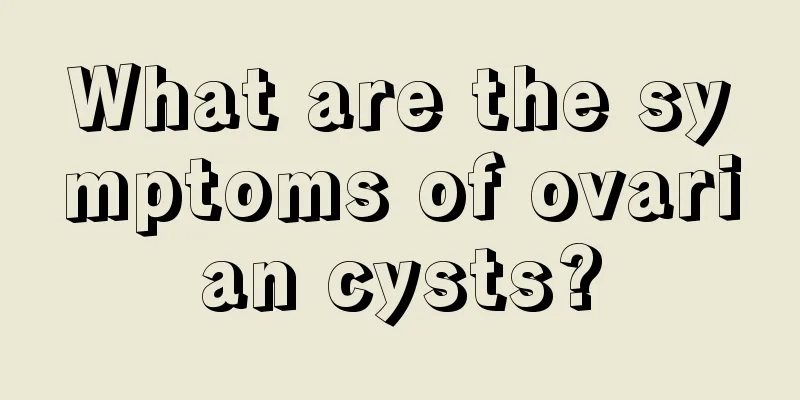What are the symptoms of ovarian cysts?

|
Ovarian cysts can cause some symptoms, which are very harmful to women's health. They often cause discomfort in the lower abdomen, a feeling of falling, and a feeling of swelling in the abdomen. Sometimes there are symptoms of pain, which often cause menstrual disorders. When the cyst twists, severe pain will occur, causing loss of appetite, nausea, etc., and even symptoms such as frequent urination and difficulty urinating. Typical symptoms: no obvious clinical manifestations, lower abdominal discomfort, menstrual disorders, etc. Ovarian cysts have no obvious clinical manifestations in the early stages, and patients often seek medical treatment for other diseases, and are only discovered during gynecological examinations. Later, as the tumor grows, the patient will feel symptoms and signs that vary depending on the nature, size, development, and presence or absence of secondary degeneration or complications of the tumor. The initial symptom before the patient touches the lower abdominal mass is lower abdominal discomfort, which manifests as a feeling of fullness and heaviness in the lower abdomen or iliac fossa. Pressing the abdomen may reveal a mass, abdominal pain, and menstrual disorders. If the cyst twists, there will be severe abdominal pain, bloating, difficulty breathing, decreased appetite, nausea, and fever. Larger cysts can put pressure on the area near the bladder, causing frequent urination and difficulty urinating. Abdominal mass The most significant characteristic of medium or smaller intra-abdominal masses, if without complications or malignant transformation, is their mobility, which can often move from the pelvic cavity to the abdominal cavity. The lump is generally not tender, but if there are complications or malignant changes, not only will the lump itself be tender, but there may even be symptoms of peritoneal irritation. Ascites sign The presence of ascites is often a feature of malignancy, but benign cysts such as ovarian fibromas and papillary cystadenomas can also produce ascites. Endocrine symptoms Symptoms such as excessive hair growth, deepening of voice, and clitoral hypertrophy are signs of masculinization cysts. Cachexia It is characterized by an extremely distended abdomen, marked weight loss, a painful facial expression, and severe exhaustion. |
<<: Can uterine fibroids be felt by hand?
>>: How to abort scar pregnancy
Recommend
Health Science | Have you fallen into the traps of high blood pressure?
May 17, 2024 is the 20th "World Hypertension...
What to prepare for pregnancy
Nowadays, many couples will make a lot of prepara...
Why is it easy to get angry after moxibustion? What should I do if I get angry after moxibustion during the dog days?
Moxibustion usually causes internal heat in peopl...
How can girls train their chest muscles to enlarge their breasts? Do one more exercise!
Small breasts are a concern for many girls, so ma...
What causes sweating after cesarean section?
For women, pregnancy is a very important event in...
How should gynecological vulvar leukoplakia be treated?
Vulvar leukoplakia is called vulvar white lesions...
What is the best way to preserve wet walnuts? What is the best way to eat fresh walnuts?
Walnuts are delicious but hard to peel, which ann...
How to enlarge breasts for little girls
Little girls are in the stage of physical develop...
What to do if a lactating woman has anemia
Many women suffer from anemia. Generally speaking...
How to check for Bartholinitis?
Bartholinitis is a disease problem that cannot be...
What are the changes in hcg values during biochemical pregnancy?
What is a biochemical pregnancy? A biochemical pr...
Pay attention to pelvic floor health and enjoy a healthy and beautiful life
Author: Ma Xia, deputy chief physician of Taizhou...
The source of all diseases! Nine major hazards of obesity, how many do you know?
Editor's note: As the saying goes, "A fa...
Yellow water after menstruation
Some girls will have yellow discharge after their...









